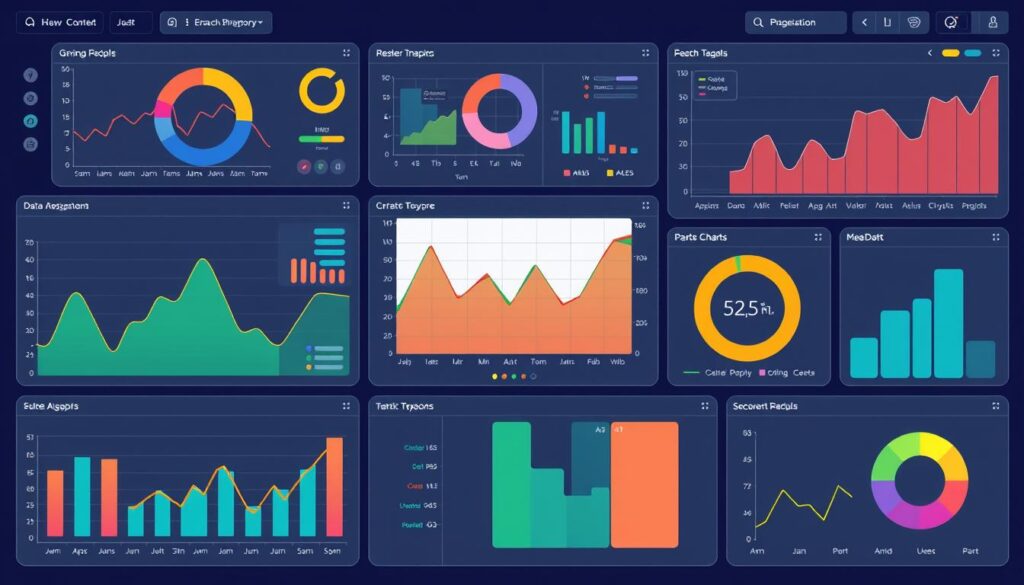In today’s business landscape, thousands of tools are available, making it challenging to identify the right solutions for your specific needs.
AI tool matchmaking emerges as a specialized service that connects businesses with the perfect tools and resources, eliminating the frustration and wasted time of trial and error.
This service creates value by analyzing your business requirements and matching them with appropriate capabilities, leading to enhanced engagement and improved marketing strategies.
As a result, you can focus on what matters most – driving your business forward with the right technological solutions.
Understanding the AI Tool Landscape
As you navigate the complex world of AI, understanding the current tool landscape is crucial. The rapidly evolving nature of AI technology has led to an explosion of new tools and platforms, making it challenging for businesses to identify the right solutions for their specific needs.
The Explosion of AI Tools in Today’s Market
The AI tool market has experienced unprecedented growth, with thousands of new tools emerging across various categories such as content generation, data analysis, marketing automation, and business intelligence. This rapid proliferation has created a complex landscape, making it difficult for businesses to navigate and find the most suitable tools.
The categories of AI tools are diverse and continue to evolve, providing a wide range of capabilities that can significantly impact business operations. From improving data analytics to enhancing customer engagement through advanced marketing tools, the options are vast.
Why Finding the Right AI Tool Matters
Choosing the right AI tool is critical for business success. A mismatched technology can lead to wasted resources, frustrated teams, and failed expectations. The right tool, however, can streamline processes, improve efficiency, and provide valuable insights that inform strategic decisions.
Common Challenges in AI Tool Selection
Businesses face several challenges when selecting AI tools, including difficulty comparing features, understanding technical requirements, evaluating pricing models, and assessing integration capabilities. The overwhelming number of options and marketing claims further complicates the evaluation process, making it difficult for businesses to make informed decisions without specialized knowledge.
By understanding these challenges and the current AI tool landscape, businesses can better navigate the complex process of selecting the most appropriate tools for their needs.
What is AI Resource Matchmaking: Earn by Connecting Clients with the Right Tools
The proliferation of AI tools has created a pressing need for a specialized service that connects businesses with the most suitable solutions, known as AI Resource Matchmaking. This service is designed to bridge the gap between the vast array of AI tools available and the specific needs of businesses looking to leverage AI technology.
Defining AI Resource Matchmaking
AI Resource Matchmaking is a consulting service that helps businesses identify, evaluate, and implement the most appropriate AI tools for their specific needs, objectives, and technical environment. This involves a comprehensive needs assessment, thorough tool evaluation, personalized recommendations, implementation guidance, and ongoing support. By developing expertise across multiple AI tool categories and staying up-to-date with the rapidly evolving AI landscape, matchmakers can provide valuable insights to businesses.
The Value Proposition for Clients
For clients, AI Resource Matchmaking offers numerous benefits, including time savings by streamlining the tool selection process, reduced risk of investing in inappropriate technology, and access to specialized expertise. By working with a matchmaker who understands both business processes and AI capabilities, businesses can bridge the gap between technical features and business requirements, leading to improved implementation outcomes.
The Business Opportunity for Matchmakers
For those offering AI Resource Matchmaking services, the business opportunity is significant. Potential revenue models include consulting fees, affiliate partnerships with AI tool providers, and premium support services. By establishing themselves as trusted advisors in the AI tool landscape, matchmakers can capitalize on the growing demand for their services, creating a lucrative business that adds value to both businesses and AI tool providers.
The Science Behind Effective AI Tool Matchmaking
Effective AI tool matchmaking requires a systematic approach that goes beyond simple comparisons to understand the intricate alignment between business objectives and tool functionalities. This process involves a deep dive into the client’s needs, a comprehensive evaluation of AI tools, and the use of data-driven insights to make informed decisions.
Understanding Client Requirements
To effectively match AI tools with businesses, it’s crucial to thoroughly understand the client’s business objectives, technical environment, user capabilities, and budget constraints. This involves developing a clear picture of their current challenges and future goals, allowing matchmakers to identify the most suitable tools.
Evaluation Criteria for AI Tools
The evaluation of AI tools involves assessing their functionality, performance, scalability, and integration capabilities, among other factors. Matchmakers must also consider the tool’s security, pricing models, and the vendor’s stability to ensure a comprehensive understanding of the tool’s value proposition.
Data-Driven Matching Processes
Data-driven matching processes utilize decision matrices, weighted scoring systems, and comparative analysis frameworks to evaluate AI tools against client requirements. By balancing quantitative assessments with qualitative factors like user experience and implementation complexity, matchmakers can provide recommendations that are both informed and practical.
Categories of AI Tools and Their Applications
Effective AI tool matchmaking hinges on understanding the broad spectrum of AI categories and their specific use cases. As businesses continue to adopt AI technology, it’s crucial to recognize the diverse applications of AI tools across various industries.
AI Writing and Content Creation Tools
AI writing and content creation tools are revolutionizing the way businesses generate content. These tools use advanced algorithms to produce high-quality written material, saving time and enhancing productivity. When evaluating these tools, consider their ability to understand context, generate engaging content, and adapt to different marketing needs.

AI Data Analysis and Business Intelligence
AI data analysis and business intelligence tools transform raw data into actionable insights, enabling businesses to make informed decisions. These tools can process vast amounts of data, identify patterns, and provide analytics that drive business growth. When matching these tools to business requirements, consider their ability to integrate with existing systems and provide value through data-driven insights.

AI Sales and Marketing Tools
AI sales and marketing tools are designed to enhance customer engagement and streamline sales processes. These tools can help with lead generation, customer profiling, and personalized marketing campaigns. When evaluating AI sales and marketing tools, consider their ability to automate repetitive tasks, provide connections between customer data points, and enhance overall sales efficiency.

AI Development and Coding Assistants
AI development and coding assistants are changing the way developers work by enhancing their productivity and skills. These tools can assist with code completion, bug fixing, and even job scheduling. When implementing AI development tools, consider their integration with existing development environments and their ability to improve the overall development process.

By understanding these categories of AI tools and their applications, you can make informed decisions and provide value to your clients through effective matchmaking. The key is to stay updated with the latest technology trends and continuously evaluate the tool landscape to find the best fit for your clients’ needs.
Building Your AI Tool Knowledge Base
The key to effective AI tool matchmaking lies in developing a thorough understanding of available tools through a comprehensive knowledge base. Successful AI matchmakers build and maintain extensive databases of AI tools, their capabilities, performance characteristics, and appropriate use cases.
Researching and Testing AI Tools
To build a robust knowledge base, you need to systematically research and test AI tools. This involves creating evaluation frameworks, conducting hands-on testing, and documenting results. By understanding both the technical capabilities and practical limitations of AI tools through direct testing and user feedback, you can provide valuable insights to your clients.

Creating Detailed Tool Profiles
Creating detailed profiles for each AI tool is crucial. These profiles should capture key information about functionality, performance, integration capabilities, pricing, support options, and real-world implementation experiences. This data will enable you to compare and contrast different tools, making it easier to find the best match for your clients’ needs.
Staying Updated with New AI Developments
The AI landscape is constantly evolving, with new tools and technologies emerging regularly. To stay ahead, you need to monitor industry news, participate in AI communities, attend conferences, and maintain relationships with tool providers. This continuous learning process ensures your knowledge base remains current and relevant.
By following these strategies, you can build a comprehensive AI tool knowledge base that will lead to more effective matchmaking and greater value for your clients.
Client Needs Assessment Framework
A structured client needs assessment framework is vital for ensuring that AI tool recommendations align with business requirements. This framework serves as the foundation for effective AI tool matchmaking, enabling you to provide tailored solutions that meet the specific needs of your clients.
Developing Effective Client Questionnaires
Creating comprehensive client questionnaires is a critical step in the needs assessment process. These questionnaires should capture essential information about your clients’ business objectives, current processes, pain points, technical environment, and constraints. By asking the right questions, you can gather valuable data that will inform your AI tool recommendations.
Identifying Pain Points and Objectives
To provide effective AI tool matchmaking, it’s essential to identify your clients’ underlying pain points and objectives. This involves analyzing the information gathered from client questionnaires and conducting discovery sessions to gain deeper insights into their needs. By understanding their challenges and goals, you can recommend AI tools that address their specific requirements.
Translating Business Needs to Technical Requirements
Once you have a clear understanding of your clients’ business needs, you must translate these needs into technical requirements that can be mapped to AI tool capabilities. This involves prioritizing requirements based on business impact, implementation complexity, and budget considerations. By doing so, you can ensure that the recommended AI tools meet the clients’ needs and are feasible to implement.
The Matchmaking Process: From Assessment to Recommendation
Effective matchmaking involves a comprehensive approach, starting with understanding client needs and culminating in tailored tool recommendations. This process is crucial for connecting businesses with the most appropriate AI tools for their specific requirements.
Initial Consultation Best Practices
The initial consultation is a critical step in the matchmaking process. It’s essential to set clear expectations, establish trust, and gather preliminary information to guide the process. This involves creating a comfortable environment where clients feel encouraged to share their needs and objectives. By doing so, you can gather valuable insights into their business challenges and identify potential AI tool solutions.
Creating Shortlists of Suitable Tools
To create a shortlist of suitable tools, you need to apply evaluation criteria and weighting systems based on client requirements. This involves analyzing the client’s business needs, identifying key performance indicators, and assessing the capabilities of various AI tools. By doing so, you can narrow down the options to the most promising candidates, saving time and increasing the likelihood of successful implementation.

Presenting Options and Guiding Selection
When presenting options to clients, it’s essential to provide a clear and concise comparison framework that highlights the strengths and weaknesses of each tool. This involves demonstrating the capabilities of each option, addressing potential concerns, and guiding clients through the selection process. By providing transparent and data-driven recommendations, you can help businesses make informed decisions that drive lead generation and enhance their overall marketing efforts.
Throughout the matchmaking process, it’s crucial to maintain transparency and document the rationale behind your recommendations. This not only builds trust with clients but also ensures that they understand the value proposition of the recommended AI tools. By following this structured approach, you can deliver effective matchmaking services that drive business growth and foster meaningful connections between people and technology.
Monetizing Your AI Matchmaking Service
To turn your AI matchmaking expertise into a profitable business, you need to consider various revenue streams and growth opportunities. Effective monetization is crucial for sustaining and growing your service, allowing you to deliver high-quality AI solutions to your clients.
Service Pricing Models
Your pricing model is a critical component of your AI matchmaking service’s monetization strategy. You can consider project-based fees, where clients pay for specific matchmaking projects. Alternatively, retainer arrangements provide ongoing revenue in exchange for continuous services. Some businesses also opt for success fees, tying their revenue to the client’s success with the matched AI tools. A hybrid approach, combining these models, can offer flexibility and attract a broader client base.
When choosing a pricing model, consider factors such as the complexity of the matchmaking process, the value delivered to clients, and the competitive landscape. It’s essential to demonstrate and quantify the value your service provides to justify your pricing and build long-term client relationships.
Partnership Opportunities with AI Tool Providers
Forming partnerships with AI tool providers can create additional revenue streams for your matchmaking service. You can explore referral programs, earning commissions for successful referrals. Affiliate relationships and reseller arrangements are other viable options, allowing you to earn revenue by promoting or reselling AI tools. Implementation partnerships can also be lucrative, where you work closely with tool providers to implement their solutions for clients.
Scaling Your Matchmaking Business
To scale your AI matchmaking business, focus on process standardization, developing repeatable processes that ensure consistency and quality. Team building is also crucial, as you’ll need skilled professionals to handle increased demand. Implementing a robust knowledge management system will help you maintain expertise and stay updated with the latest AI developments. Finally, consider expanding your service offerings to cater to a broader range of client needs, enhancing your growth potential.
By diversifying your revenue streams, building strong partnerships, and scaling your operations, you can create a thriving and profitable AI matchmaking service that delivers significant value to your clients.
Case Studies: Successful AI Tool Matchmaking
AI tool matchmaking has emerged as a crucial service, helping companies navigate the complex landscape of artificial intelligence. By connecting businesses with the right AI tools, matchmakers enable them to leverage technology that drives growth and improves efficiency.
Small Business Transformation with AI Writing Tools
A small content creation agency struggled to produce high-quality content at scale. Through AI tool matchmaking, they were introduced to an AI writing platform that enhanced their content creation capabilities. The tool helped them generate engaging blog posts and articles, resulting in a significant increase in client satisfaction and a 30% boost in their revenue.
Enterprise Sales Enhancement with AI Prospecting
A large enterprise sought to improve its sales outreach efforts. AI tool matchmaking led them to an AI prospecting tool that personalized their sales emails and calls. This resulted in a 25% increase in lead generation and improved conversion rates, ultimately driving business growth.
Productivity Gains Through AI Development Tools
A software development company faced challenges in coding efficiency. Through AI tool matchmaking, they were matched with an AI development tool that automated routine coding tasks. This led to a significant productivity gain, allowing developers to focus on more complex tasks and improving overall code quality.
These case studies demonstrate the tangible value of effective AI tool matchmaking across different business contexts and tool categories. By understanding client needs and matching them with the right AI tools, businesses can achieve significant improvements in efficiency, productivity, and revenue.
Overcoming Common Matchmaking Challenges
As an AI matchmaker, you’ll inevitably face challenges that require strategic solutions to ensure client success. The process of matching AI tools with client needs is complex and involves several potential pitfalls. To deliver successful outcomes, you must be equipped to handle these challenges effectively.
Managing Client Expectations
Managing client expectations is crucial for the success of AI tool matchmaking. This involves educating clients about the capabilities and limitations of AI tools, setting realistic timelines, and establishing clear metrics for success. By doing so, you can ensure that clients have a clear understanding of what to expect from the AI tools recommended to them. Clear communication is key to managing expectations and ensuring client satisfaction.
Handling Tool Limitations and Compatibility Issues
AI tools often come with limitations and compatibility issues that can impact their effectiveness. To mitigate these challenges, it’s essential to thoroughly evaluate AI tools during the selection process and identify potential problems early on. Developing strategies to address these issues can help ensure seamless integration and optimal performance. Compatibility testing is a critical step in this process.
Adapting to Rapidly Evolving AI Capabilities
The AI landscape is constantly evolving, with new capabilities and tools emerging regularly. To remain effective, AI matchmakers must stay up-to-date with the latest developments and be prepared to reassess previous recommendations. This involves ongoing learning and a commitment to adapting to changing circumstances. By doing so, you can continue to provide clients with the most relevant and effective AI solutions.
Future Trends in AI Tool Matchmaking
The future of AI tool matchmaking holds much promise, driven by advancements in AI technologies and shifting business needs. As the AI landscape continues to evolve, it’s essential to stay ahead of the curve to remain competitive.
Emerging AI Technologies and Applications
New AI technologies are emerging, including multimodal AI, autonomous agents, and specialized industry solutions. These advancements will significantly impact the AI tool matchmaking landscape, offering businesses more sophisticated tools to streamline their operations and improve productivity. For instance, multimodal AI can process and integrate multiple types of data, such as text, images, and audio, providing a more comprehensive understanding of business needs.
Predictive Matchmaking Using Machine Learning
The integration of machine learning in AI tool matchmaking is set to revolutionize the process. By leveraging data from previous matchmaking engagements, predictive matchmaking can improve recommendation accuracy, saving businesses time and enhancing their lead generation capabilities. This approach enables matchmakers to provide more personalized and effective tool recommendations, ultimately driving business growth.
Integration and Ecosystem Development
The trend towards AI platforms that combine multiple capabilities is gaining momentum. These platforms offer businesses a more integrated solution, simplifying the process of tool selection and implementation. As a result, AI matchmakers must adapt to these changes, focusing on the connections between different tools and platforms to provide seamless business solutions.
By understanding these future trends, AI matchmakers can prepare for the evolving landscape, ensuring they continue to provide value to their clients. Whether it’s through emerging technologies, predictive matchmaking, or ecosystem development, staying informed is key to success in the dynamic world of AI tool matchmaking.
Conclusion: Becoming an Expert AI Resource Matchmaker
In today’s tech-driven business environment, the role of an AI resource matchmaker is not only valuable but also increasingly in demand. As the AI industry continues to expand, businesses are faced with the daunting task of selecting the most appropriate tools from a vast array of options.
Becoming an expert AI resource matchmaker represents a significant professional opportunity at the intersection of technology expertise and business consulting. This involves developing comprehensive tool knowledge, implementing structured assessment methodologies, and providing client-focused recommendation processes.
The unique value proposition offered by AI matchmakers lies in their ability to save businesses time and amounts of data by connecting them with the most suitable AI tools. Whether you’re working with a small startup or a large enterprise, your expertise can help them save time and focus on their core operations.
To succeed in this field, it’s crucial to commit to ongoing learning and professional development. The AI landscape is constantly evolving, with new tools and technologies emerging regularly. By staying up-to-date with these developments, you can maintain your expertise and provide the best possible service to your clients.
The potential career paths and business models available to AI matchmaking experts are diverse. You can work as a consultant, develop your own platform, or partner with AI tool providers to offer a comprehensive system. Some matchmakers also explore lead generation opportunities, creating a win-win situation for both businesses and AI tool developers.
As you consider pursuing AI matchmaking as a professional focus, remember the importance of ethical practices. This includes maintaining transparency, advocating for your clients’ needs, and providing honest assessments of AI tools. By doing so, you can build trust and establish a strong reputation in the industry.
In conclusion, becoming an expert AI resource matchmaker offers a promising career path that combines technology expertise with business acumen. By developing your skills and knowledge in this area, you can create a successful business or consulting practice that delivers real value to clients. Whether you’re just starting out or looking to expand your existing services, the world of AI matchmaking is definitely worth exploring further – you can even request a demo to see how some AI tools work in practice.
